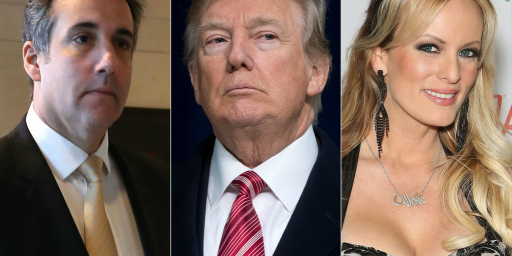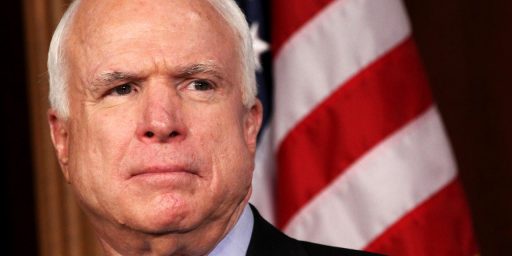Electability and the 2008 Presidential Campaign
Gallup’s Lydia Saad analyzes a recent poll conducted by her firm of the leading contenders for the 2008 presidential nominations and finds that perceptions of “electability” are already influencing candidate preference. This matches the findings of a January 2004 Gallup server of self-identified Democrats: “When forced to choose, 6 in 10 Democrats (60%) said they would rather support a candidate for the nomination with the best chance of beating Bush. Only 36% opted for the candidate who comes closer to sharing their views, but does not have the best chance of winning.”
It should be noted that the 2004 poll was purely hypothetical (i.e., not candidate-specific) and that both surveys are of adults rather than likely voters. It’s not inconceivable that likely voters are more opinionated and less tactical in their thinking. Still, the findings are interesting.
Among the smaller registered voter subsamples:
- Hillary Clinton beats John McCain 50-47 and Rudy Giuliani beats Hillary Clinton 50-48. Both matchups are well within the margin of error.
- Barack Obama ties McCain 48-48 but gets trounced 52-43 by Giuliani.
Interestingly, Obama’s dropoff against Giuliani comes largely from Democrats:
When voters are asked to choose between Obama and Giuliani, only 69% of Democrats and Democratic leaners say they would vote for Obama, while 28% say they would vote for Giuliani. By contrast, 79% of Democrats prefer Clinton when she is matched against Giuliani.
This Democratic defection against Obama largely explains why Obama is currently the weaker opponent for Giuliani than is Clinton. Among all voters, Giuliani beats Obama by nine points, but he leads Clinton by two points, 50 to 48.
Also of interest:
In a late January 2007 Gallup poll, the frontrunners of both parties (Clinton for the Democrats and Giuliani for the Republicans) are generally perceived by members of their own parties as being more likely to succeed in the general election.
- Forty-four percent of Democrats and Democratic-leaning independents say Clinton has the best chance of beating the Republican nominee in the 2008 general election, compared with only 27% choosing Edwards and 21% choosing Obama on this dimension.
- On the Republican side, Giuliani leads McCain, 55% to 38%, as the candidate perceived to be more likely to win next fall.
This would partly explain why Democrat-leaners would be more prone to vote for Clinton than Obama. It doesn’t, however, explain why, given a theoretical general election matchup with Giuliani, the dropoff is so much greater for Obama than Clinton.






Could it be no one really know what the hell Obama stands for? All I hear from him is platitudes about needing a new kind of politics…
I don’t understand voting based on “electability”. First off, we all remember how much being “electable” helped Kerry win his primary, but he lost because he wasn’t a strong candidate. Being “electable” only helps you win primaries, not the general election, and it only helps in the primaries because of the perceptions that it has some effect in the general, which of course it doesn’t.
Maybe Clinton has this mysterious “electability” attribute, but does that make her a good candidate for President? Does it make Giuliani a good candidate for President? Why can’t being “Presidential” be the measure we use for a primary candidate?
What Mark said; the defections will taper off with time as Obama’s positions become better known.
Why would people want a candidate that would be able to beat Bush?